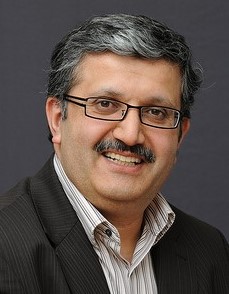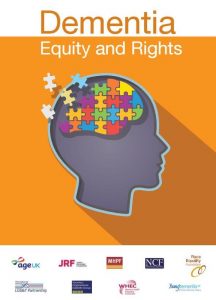Jabeer Butt has worked in and with the voluntary sector to promote race equality and address health inequalities for many years. He was awarded an OBE in 2013 for his achievements in health and is currently Deputy Chief Executive of the Race Equality Foundation. Following the recent publication of Dementia: Equity and Rights, he offers a personal perspective on why greater awareness of the disease within our aging and diversifying ethnic populations is so important.

How many of your grandparents have you met? It’s a simple question, but a potentially revealing one. I only met one of my grandparents as the other three had passed away before my birth. My son has met three of his. If the trends in the ageing of Britain’s black and minority ethnic communities continue, my grandchildren are likely to meet all four of theirs.
For those of us whose families migrated to the UK after the arrival of the Windrush in 1947, we often came from communities where few people lived into what we now consider to be ‘old age.’
Rarely did we experience the benefits of people who not only lived into their 60’s, but into their 70’s and 80’s. But this is changing. The 1991 Census reported just over 6,500 people of Caribbean origin over the age of 75, by 2011 there were over 37,000. In 1991, there were just over 10,000 people of Indian origin over 75 and by 2011, this figure had risen to over 44,000.
But this longevity has increased the risk of experiencing the diseases associated with old age, including dementia. Our chapter in Dementia: Equity and Rights, draws on available evidence to suggest the incidence of Dementia amongst some black and minority ethnic communities is on the rise, and may be more prevalent amongst African-Caribbean and South Asian communities than the white UK population.

It is difficult to say whether this comparatively new experience explains the limited knowledge about dementia amongst black and minority ethnic communities, but lack of awareness is certainly something that needs to be tackled.
Worryingly, at present, it appears support is often not organised or commissioned to handle this challenge, with evidence of comparatively poorer access, experiences and outcomes.
Importantly, aspects of this picture appears to be repeated for others such as people with learning disabilities or older people from lesbian, gay, bisexual and transgender communities, as well as those with mental health problems.
Lessons that we can learn from examples of effective support is that a community development approach is vital, with significant investment in engagement, including through black and minority ethnic-led voluntary and community organisations.
This will need to be combined with implementing personalisation that addresses equality seriously. So for example, it is difficult to see how personalisation will be achieved if service providers are not able to communicate effectively and do not have access to good quality community language interpreters.
For many black and minority ethnic older people and their families dealing with living into older old age will be no more, or no less, then dealing with the everyday challenges of daily living. But for a significant group old age will be accompanied by the experience of living with dementia. What Dementia: Equity and Rights suggests is that we have some way to go ensure that dignity and respect is experienced by all.
7 comments
Comment by Tim Leung posted on
I found this is very true that more is needed into supporting the immediately families who cope with their love ones suffering from old age and dementia. More importantly, many of these families rely on community groups and volunteers to lessen their burden. So it is vital that not only practical supports are offered to these families and individuals; it is also important that funds are channelled to communities and charities that work with these communities; families and individuals.
Comment by Walter posted on
Great!, very important report. It is necessary that the affected community is aware of this, so can be really effective, but not only the community that is affected if not also the people in general, that this be aware that we are all equal and deserve respect.
Comment by Valerie Mathewon posted on
As information worker for the Alzheimer's Society I am conscious of the need to communicate with people of all nationalities regarding dementia awareness. Recently the Dementia Roadshow bus was at Lakeside Retail Park and it was pleasing to have the opportunity to engage with people from Albanian, Indian, African Caribbean and African communities sharing our Questions about dementia z cards, Dementia Friends campaign and the local services on offer by the Society. It is clear that a whole system approach is required and the importance of taking information to the people as they go about their everyday lives is highly effective. Personally as a Dementia Champion Volunteer since 2013 I have been able to make over 400 people dementia friends through combined effort as a paid worker for the Society and as a member of my local community running information sessions in my local church, library, community centres and other places where people invite me in. Dementia know no boundaries it affects people of all colour and culture, professionals, manual workers, men and women......... We need to take a public health approach based on person centred community development methodology - sadly investment in community development based practice has been reduced but many people like me who were trained via the public sector are still using those skills and experience to make a difference. Let's see all public sector housing, finance, social work, education workers, health workers completing dementia awareness training as core competences and putting that knowledge into practice daily to create the wave of change needed.
Comment by Martin C.Louwers posted on
Personal Dementia has hit me like a bomb.MY local Medicals have
behaved as if a spill of a bad couch arrived. No medical person has taken the trouble to consider where I go from here.
What can I expect .....when and how will my own body effect. When and what can do my Dr, to consider what will help me to
or can expect my near future, etc.etc. Your advise please and thank you.
Thanking you in advance.
Comment by Elizabeth Edgar posted on
We're just putting the finishing touches to a new guide about dementia and diversity. It's aimed at leaders and managers and is full of best practice case studies, scenarios and tips. It's been funded by the Department of Health and published by Skills for Care.
Comment by Dr Sandip Raha posted on
One of challenges are for those from Ethnic minority to come forwrd to seek diagnosis and support. It is still a big taboo in 21st century more so in this group than non ethnic population.I have few friends whoce family members are only diagnosed at very late stage when they sought medical attention for other reasons. How we engage them is the challenge.
Comment by David Truswell, Dementia Alliance for Culture & Ethnicity posted on
Important to recognise that increased longevity and the age related risked of dementias such as Alzheimer's disease are a new cultural experience for all cultures and create a change in the landscape of the cultural understanding of 'later life'. The Dementia Alliance for Culture & Ethnicity http://www.demace.com supports working both within and across minority ethnic communities to build understanding and support through directly engaging with communities. For the UK's minority ethnic communities dementia rights are vital to securing equitable health care access to the right care and support at the right time. Demographically the Irish, African-Caribbean and South Asian (Indian) communities have the highest lifetime health risk factors for vascular dementia linked to risk in these populations of cardiovascular disease and hypertension. With the anticipated 7 fold increase in numbers of people with dementia oin the next 30 years likely to most affect these communities, commissioners need to work with communities to get the right services and support in place.